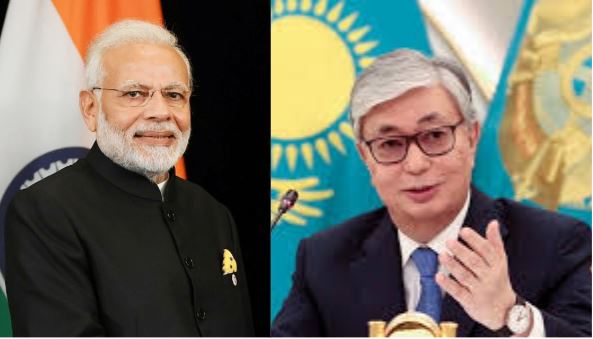While countries battle China from all sides, left, right and centre in the wake of Wuhan virus pandemic, one region seemingly gets ignored which is pivotal to China’s fortunes in its immediate neighbourhood. The region is ‘Central Asia’ through which China is looking to advance its One Belt-One Road (OBOR) initiative. And one such country in the region is Kazakhstan which India can potentially use as an ally to break China’s back in the post COVID-19 world.
Under PM Modi’s ‘Connect Central Asia’ policy, India always looks to work together cohesively with the nations of Central Asia whereas China is only looking to exploit them.
It has been time and again reported that following the collapse of the Soviet Union, China has exploited Kazakhstan to pursue its goals and with India looking to increase its interest in the region, China might have lost the tactical advantage of proximity it once enjoyed.
Simmering anti-China sentiment in Kazakhstan
Kazakhstan President Kassym-Jomart Tokayev, who is about to complete one year in office had earlier announced an easing of the restrictive legislation on the expression of dissent and public demonstrations in the country. As a result, much like the entire world, palpable anti-China sentiment is simmering in the land locked country too.
The current wave of resentment towards Chinese influence has seen an upswing since 2016, owning to a controversial Land Code which enabled government sales or leases of agricultural land to foreigners/Chinese for a period of 25 years.
The fate of Kazakh Muslims and Uighur Muslims in China
The natives of Kazakhstan are also protesting against the Chinese economic invasion of the country that is happening in the garb of OBOR. It is also one of the few Islamic countries where protests have been happening against China’s ethnic cleansing of Uyghurs Muslims in Xinjiang.
More than one million Muslims – including Uyghurs and Kazakhs – have been sent to “re-education camps” in Xinjiang and the Kazakhstan government finds itself in a tough corner as it faces an exasperated population who are worried about the fate of their relatives in Xinjiang.
China has invested heavily in Kazakhstan. The China-Central Asia gas pipeline–connecting Turkmenistan with China–delivered 23 billion cubic meters of natural gas to Beijing in the first half of 2019. With OBOR, China wants to cripple Kazakhstan and make it adebt-trapped nation which would ultimately cede its sovereignty to China.
Growing relations between India and Kazakhstan
Relations between India and Kazakhstan are ancient and historical going back to more than 2000 years. There has been a constant and regular flow of trade in goods and, more importantly, exchange of ideas and cultural influences. India was one of the first countries to recognize the independence of Kazakhstan. Diplomatic relations were established in February 1992.
With such common points in between, India can put a hand on Kazakhstan shoulders and turn it towards itself. It was only under Prime Minister Narendra Modi that India started paying attention to Kazakhstan.
Former Kazakhstan Ambassador to India, Bulat Sarsenbayev admitted that until 2015, the Indian population wasn’t fully aware of Kazakhstan’s economic opportunities and Prime Minister Modi’s 2015 official visit and top-level negotiations spurred economic cooperation. Additional impetus came during PM Modi’s visit to Kazakhstan for the SCO Summit and the opening of EXPO 2017.
Kazakhstan is one of the major sources of uranium for India after Canada and Australia and Kazakhstan is the main trading partner of India as far as Central Asia is concerned so much so that the Kazakh-Indian trade exceeds India’s combined trade with other countries in Central Asia.
The trade turnover between the countries reached $1.2 billion in 2018 (in 2015, the trade turnover amounted to $461.6 million). In the first three months of 2019, bilateral trade between Kazakhstan and India amounted to $293.1 million, which is 35.9% more than in the same period last year.
The bilateral trade this year so far has already touched $1.5 billion. The mutual trips of the citizens between the two countries have also intensified in another sign of the deep ties shared by the countries as in 2018, Kazakhstan granted 25,000 visas to Indian citizens up from 6,000 visas it granted in 2014.
The two countries share a strong bond in areas such as space exploration, military-technical cooperation and IT.
With such deep connections in trade and commerce and steady investments by India, Kazakhstan could soon be a prime ally for PM Modi. The rising anti-Chinese sentiment in the country presents a great opportunity for India and it must move swiftly to ensure that Kazakhstan doesn’t become the latest prey of the vicious Chinese debt trap. We have already seen it in our neighbourhood with Pakistan and Sri Lanka.
